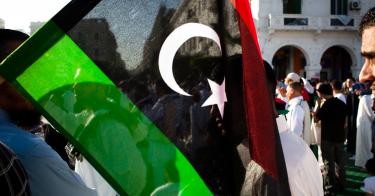Getting grumpy over the administration’s Libya policy is a just cause.
There is no nostalgia for President Barack Obama’s “lead from behind” policy that left the country in ruins, an American compound in flames, and a U.S. ambassador and other brave Americans dead.
But let’s be honest, President Donald Trump hasn’t done much better at making things better. This is not just about grading presidents. There are good reasons to get U.S. policy for Libya right.
Trump gets an “A” for his instincts on the Middle East.
This region is strategically important to the United States.
That said, the U.S. is not the region’s babysitter. What is needed is sustainable regional security solutions that deal with the twin great dangers: the destabilizing actions of Iran and organized campaigns by transnational Islamist terrorists.
That’s crucial for the stability of the region and to create the conditions for the flourishing of better governance and economic freedom, essential developments needed to add a shot of prosperity to the stability formula.
The right security architecture for the region builds on a backbone of productive bilateral relationships between the U.S. and key nations. Not all of these states are big power brokers.
In geopolitical architecture, small states matter too.
These bilateral relations don’t have to be perfect. They don’t have to be friction free. They just have to be durable.
The backbone starts with Turkey and Iraq, states of the Gulf Cooperation Council, Jordan, Israel, Egypt, Morocco, and Tunisia.
Egypt, Morocco, and Tunisia are not only part of the Greater Middle East, they are also the firebreak that prevents the security challenges of North Africa and the Sahel from flowing north into the Middle East, the Mediterranean, and Europe.
Libya is a lynchpin state.
The fate of Libya is not a vital U.S. interest, but the U.S. task of building the backbone is just much easier with a stable and secure Libya. So too is the challenge of keeping the problems of North Africa and the Greater Middle East from being a problem for Europe (another strategically important region for the U.S.).
The Mess That Is Libya
There is an officially recognized government in Libya, the Government of National Accord, or the GNA, led by Prime Minister Fayez al-Sarraj.
The problem is, it doesn’t govern all the country and rightly comes under criticism for a host of reasons.
Meanwhile, Khalifa Belqasim Haftar commands the Libyan National Army (LNA), which is at odds with the GNA and recently launched military operations to oust the government from Tripoli, the capital. No military or political force in Libya has the capacity to take over the whole country.
Meanwhile, there are a number of external parties, all vying to protect their interests and prop up one faction or another. The most influential players include Italy, France, Egypt, the United Arab Emirates, and Turkey.
There is also meddling from Russia and others.
Ghassan Salamé, the special representative of the secretary-general and head of the United Nations Support Mission in Libya, is responsible for sorting this mess out. Given that he works for the U.N., you can imagine how that is going.
For its part, until now, the U.S. has largely outsourced the hot mess to others.
The president recently took a call from Haftar. There are rumors Haftar intends to visit the U.S. Friends of Haftar are lobbying the administration to support him.
That is extremely unlikely to happen.
Haftar doesn’t have the capacity or international support to succeed with a winner-take-all strategy.
It makes no sense for the U.S. to waste manpower, treasure, and American prestige and credibility to win Libya for him. Further, the last thing Libya needs is yet another strongman.
AWOL on the Potomac
Other than confuse everyone on U.S. policy after his happy chat with Haftar, the direction of U.S. policy for Libya remains a big question mark.
That’s ridiculous.
The U.S. can make a huge difference—and it doesn’t require sending the 82nd Airborne Division or writing a big check.
The U.S. has the heft and relationships with the important players to get them to act in concert in Libya.
Trump should lean on them to lean on their Libyan clients and press for a genuine political agreement to hold everybody accountable. This would also lead an effort to limit the damaging effect of the crisis on neighboring states such as Tunisia.
If Trump would just take this step, he would lift his grade from an “F” to a “B+.” More important, he would greatly advance the cause of America’s interests in the Middle East.
This piece originally appeared in The Daily Signal




